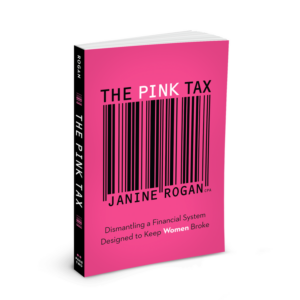How to overcome financial decision fatigue and start building wealth
Janine Rogan, CPA and author of The Pink Tax, offers some concrete financial planning and money management tips.
Advertisement
Janine Rogan, CPA and author of The Pink Tax, offers some concrete financial planning and money management tips.

Author, public speaker and Chartered Professional Accountant Janine Rogan wants to empower women to master their finances and help “dismantle a system designed to keep women broke.” In this excerpt from her new book, The Pink Tax, Rogan explains how to better manage your finances and reduce money stress.
Each day, women are faced with up to 35,000 decisions—yes, you read that number correctly—ranging from what sweater to wear to what to have for lunch to who to hire for an open role, and everything in between. Decision fatigue is when you become overwhelmed by the number of decisions you must make in a day. If your tank is empty and you don’t have the capacity to deal with your finances, why would you add money decisions to an already long and overwhelming list? A full 22 percent of women ignore their financial stress. But as you now know, ignoring your money is a Pink Tax you can’t afford!
One simple solution to minimize financial decision fatigue is to automate as much of your finances as you can—take bill payments and money transfers off your to-do list entirely. Make it so that you only need to quickly check in with your money each month. Don’t spend time in the weeds moving money from one account to another. If you enjoy money management, your time is better spent learning to analyze and project the future power of your dollars rather than doing something that can be easily automated.
Years ago, my husband and I automated our banking transactions, and it changed the way we manage our money. Instead of worrying if we’ve missed a bill payment or if we remembered to move money to our savings account, we know it’s all taken care of. As new parents, we are so grateful we did this, because OMG why is being a parent so exhausting and all encompassing? Because we are paid on the fifteenth and thirtieth of each month, we set up our money transfers—from chequing to savings, chequing to investing accounts, and chequing to bills—for the sixteenth and the first. For large bills (hello, property taxes), we divide the cost over twenty-four automatic transfers and move that money into its own savings account so when we need to pay, the money’s there. If your income fluctuates and you are worried about cash flow some months, you can always change the amount or defer a transfer. The bottom line is that you have enough on your mind. Take your basic financial transactions off the constant list and lighten your mental load.
Tracking your progress sounds simple, but it makes such a big difference when you’re looking at your psyche as it relates to finances. It’s easy to be hard on yourself about money:
I’m sure you’ve said one if not all of these things to yourself before. I know I have.
But you have a choice: you can focus on the little things and beat yourself up over them. Or you can take a step back, look at the big picture, and notice how far you’ve come. You cannot see the forest from the trees.
The latter option is exactly what tracking your progress is about. You don’t have to do it often, but even a couple of times a year will give you a good baseline for your progress. Start by calculating your net worth, which is the sum of your assets (what you own) minus your liabilities (what you owe). You can see an example below. Check in at intervals to see that it’s moving in the right direction.
If your net worth is negative, don’t worry too much about it—the fact is, women are more likely than men to have a lower and more negative net worth. Focus on your progress. As you check in over the months and years, you want your net worth to increase. That’s the direction you are heading in—but sometimes you may have less than you did the previous time you checked in. The housing or stock market may drop, or you may need to make a large purchase or repair. That’s okay. Focus on the overall direction of your wealth.
I started tracking my net worth in 2012. I do it every month because that’s just who I am; I do love a good Excel spreadsheet. I have ten-plus years of data, and I’ve watched our net worth go from $17,000 to $650,000—a 3,700 percent increase. I share these numbers not to brag but to inspire you to start amassing wealth. There were months, sometimes even years, when unexpected financial turmoil hit—job loss, study leave, unexpected expenses, maternity leave—but the general trend was always up. Yours can be too.
| Assets | Amount |
| Home | $550,000 |
| Vehicle | $30,000 |
| Cash (chequing account) | $6,000 |
| Savings account | $22,000 |
| Investment accounts (TFSA, RRSP, 401K, Roth IRA) | $65,000 |
| Children’s education accounts | $30,000 |
| Fine art | $10,000 |
| Total assets | $713,000 |
| Liabilities | Amount |
| Student loan | $20,000 |
| Mortgage | $350,000 |
| Personal loan | $2,000 |
| Credit card debt | $500 |
| Total liabilities | $372,500 |
Net worth (assets minus liabilities): $340,500

Janine Rogan worked as an accountant and tech consultant before founding the Wealth Building Academy and starting her own podcast. Now she is a prolific public speaker and has even been featured on TEDx. You can watch more of her work on her YouTube channel.
This article was excerpted from The Pink Tax (Page Two Books, May 2023). You can order the paperback version on Amazon.
Share this article Share on Facebook Share on Twitter Share on Linkedin Share on Reddit Share on Email
UNanticipated rainy days do crop up during these volatile economic environment.
Avoid unnecessary impulse purchases and save at least 10%
of your Total income and invest in risk free investments such as TFSA.
Bottomline Never spend more then your nett income.